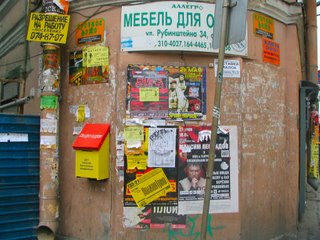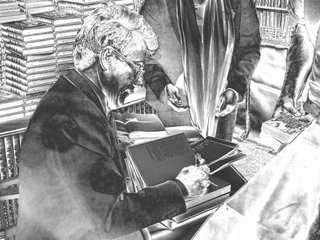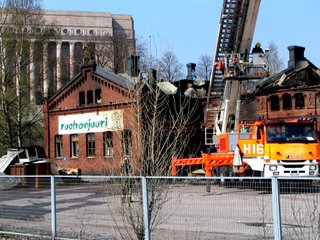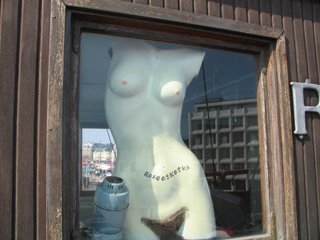Ennen lähtöäni salille tsäppäilen koneestani viimeiset uutiset hyvinvointivaltion historian päättymisestä. The Scotsman referoi jenkkitutkijan kirjaa, jonka sanoman tiivisti jo 1700-luvulla pappi Malthus: "Köyhäinapu jakaa vain uudelleen köyhyyttä". Sama message on luettavissa länsimaiden kehitysavun tuloksia käsitelleistä viime aikaisista tutkimuksista.
Hyvinvointivaltiolla alkaa olla maailmassa entistä vähemmän puolustajia. Ensin meni kommunismi, seuraavaksi ajetaan alas sosiaalivaltio. Näin se menee Scotsman lehden artikkelin mukaan:
Poverty of thought condemns the poor
FRASER NELSON
TWENTY years ago, a discovery was made which changed the way America looked at poverty. An academic hired to monitor government benefit schemes proved a theory which sounded incredible: welfare was making poverty worse.
He spent the next 10 years being attacked as a right-wing zealot, especially as he found the institution of the family the best weapon in fighting poverty. Left-wing academics commissioned studies to prove him wrong, but found the same.
After setting the intellectual framework for Bill Clinton's acclaimed welfare reform, Charles Murray has become a world authority on welfare traps. But when he speaks about the most pernicious squalors of the planet, one sticks in his mind: Easterhouse.
In Washington last week, he was discussing his new book, In Our Hands - which proposes abolishing all welfare schemes and giving every adult in the country a flat £6,000 a year. Bankers, single parents, college dropouts and pensioners get the same.
The schemes of Glasgow stand out, on a world scale, because so much has been spent to alleviate poverty with calamitous results. The cash meant to end poverty instead creates jobless, drug-infested ghettos with dire life expectancy.
When British politicians - including Jack McConnell - talk about poverty they look at income alone. Families can be declared to have been "lifted out of poverty" if their package of benefits crosses a certain threshold. Murray has a different measure.
"Is there any place where it is harder to make a good life for yourself than Easterhouse? Imagine what you would do if you moved there. Maybe build a little wall for yourself with books and music, maybe venture out nervously to the street.
"But no matter what your income is, you will not find the friendly and supportive communities needed as the raw materials for a satisfying life. Perhaps you could find that when Easterhouse was first built. But not any more."
Anyone who considers poverty to be Scotland's most urgent problem should hear Murray out. His message will not be repeated in Westminster or Holyrood because he believes that politicians, of any hue, are the problem.
His starting point could be lifted from the Labour manifesto: that people can achieve more together than they do apart. Specifically, he believes that the welfare state has torn up links which previously bound low-income families and communities together.
The slums which Easterhouse replaced were cramped with no inside toilet, but they did have community. People looked out for each other. They had to: each was the other's primary safety net. But as the welfare state grew, the state took over.
This led to the atomisation of society. People's relationship was with the state: not with each other. Young men can now choose welfare dependency as a lifestyle. The state guarantees a father's income without his presence.
While the middle class can afford to be liberal about family break-up - lone parents usually have the money and family support needed - Murray believes this trend is wreaking catastrophic damage on the poorest reaches of society.
There are now reams of evidence, he says, showing that the children of lone parents are, for example, seven times as likely to fall into poverty, four times as likely to be expelled from school and twice as likely to go to prison.
If you accept these facts - which Murray says are unchallenged - then fighting poverty means fighting family-breakup. While this is the approach taken in America, by left and right, it is too moralistic a mission for any British politician to touch.
"In Britain, if you say the things people like me say you are seen as hard-headed, mean and nasty," says Murray. "I believe cruelty consists of a glib assumption that government support for children can compensate for the absence of the father."
The next charge he levels against the welfare state is spreading joblessness. While there are 81,500 claiming jobseekers' allowance in Scotland this is as nothing compared to the staggering 482,000 Scots claiming other out-of-work benefits.
The hundreds of thousands of immigrants who flock to Britain each year are proof that there are plenty of jobs going. Yet a quarter of a million Scots have been on benefits for five years or more and are statistically more likely to die than work again.
If it was not for the welfare state, how many of these would be forced to find work and break the cycle of poverty? When Clinton placed a five-year lifetime limit on benefit payments, welfare-dependency halved.
And something else happened, so dramatic that Americans are still stunned: violent crime collapsed to the lowest level since records began. An exact, horrific reverse has been going on in Britain where violent crime has trebled since Labour came to power.
While Scotland's crime rate has held steady, this is little cause for celebration. The UN has already named Scotland as the most violent place in the developed world, a picture that seems incongruous to those who live here.
Or, more precisely, to those who don't live in Easterhouse, Castlemilk, Dennistoun or the zones of Falkirk and Aberdeen where you are four times as likely to be hospitalised as in Scotland's many affluent and low-crime areas.
Every compass needle needs a butt end - which is why Scotland's ghettos are such a useful example for people like Murray. In welfare, as in healthcare, it points to the direction not to follow.
Murray's new book, not for sale in Britain yet, was given to Gordon Brown by a mutual friend last month. The Chancellor is genuinely driven by a commitment to tackling poverty, yet is gripped by belief that greater social tinkering is the answer.
"We know the limits of [government] interventions," says Murray. "The United States tried everything, we evaluated everything and nothing worked. That is not hyperbole, that is a statement of 30 years of research."
Since Labour came to power, life expectancy in Easterhouse has dropped two years to a Bosnia-league 65 years. Hospital admissions for alcohol-induced conditions have rocketed by 48 per cent. Half of all children are in now workless households.
Most of Easterhouse is also doubtless getting more money through government schemes, but can anyone really argue that life has grown much better?
This is Murray's point, and he believes Britain's political class is so keen to be seen as being generous to the poor that they cannot accept their interventions are - as he puts it - "compounding human misery rather than alleviating it."
Is Scotland ready for such an argument? Mr Brown and Mr McConnell both believe the answer lies in even greater government involvement. Murray says this will simply accelerate the disintegration of civil society in the poorest communities. It is too grave a warning, from too credible a source, not to take seriously. No one worried about poverty can reject it from gut instinct.
There is an easy way to resolve this. The facts are out there, and the Scottish Executive is fond of commissioning research. If Brown and McConnell disagree with Murray, all they need to do is commission the studies to prove him wrong.
Scotsman.com
Amerikan metodistit ovat ryhtyneet varautumaan hyvinvointivaltiouskonnolla varustettujen eurooppalaisten siirtolaisten torjuntaan. Wesley Journalissa Bushin hallinnon vihaamat meksikaanitkin ajavat euroopplaisten ohi, jotka pyrkivät lehden mukaan levittämään slummahtanutta hyinvointivaltio aatettaan Amerikkaa EU:n tulevan konkurssin jälkeen:
Both France and Italy had dismal news this week. It may mark the beginning of a long-predicted out-migration, especially of their young, with the U.S. as a major destination.
France has been stuck in an unsustainable position for several years, along with most of "Old Europe." With low birth rates and a growing "gray" population, there are increasingly too few workers to support not only the retirement systems, but all the rest of the French Welfare-State programs as well. The French economy has been stagnant for years, with unemployment around 10% (compare to 4.7% in the U.S.) and economic growth around 1% (compare to 3-4% in the U.S.) The government has provided jobs, but by itself is becoming the main employer in France. About 25% of all workers are employed directly by the government. But without a good tax base from a healthy economy, that also cannot continue.
The French government tried to take a tiny - but brave - first step out of economic slow death, with a law allowing employers to fire any new employee younger than 26, for any reason. (But only during their first 2 years of employment.) That was to encourage more hiring of young people, 25% of whom are jobless. At present, employers do not want to hire them, because they can never be fired. What was the response? The youth - and unions - of France shut down the country with their demonstrations rather than permit this law. Finally, the government had to give it up. The result? No exit from mass unemployment. And no escape from French decline. When such efforts to turn around are late or blocked, disintegration arrives even sooner.
Italy has its own problems. Berlusconi, a pro-capitalist free-trader, probably just lost to Prodi, with his welfare-state views, and alliance with the Marxist party. The results can be expected to bring more French-style problems to Italy. The election was so close that the results are not yet certain, and may leave the government hanging for months until a new election. Or not. Either way, it will make the economy worse off than it is now.
It is widely expected that as Europe declines because of such problems, the younger workers will not consent to keep working there. Their small generation will face greater and greater taxes to support a larger graying population and a continually-growing welfare state. It is predicted that they will leave for countries with stronger economies. First a brain-drain, as the smarter ones bail out ahead of the others, then eventually a drain of ordinary workers.
Matthew Schofield writes in the Detroit Free Press, "As jobs vanish, the financial underpinnings of European welfare states crumble. 'To be honest, I see my future elsewhere,' said Inam Akil, 17, one of those marching in a protest last week. 'I mean, France is a beautiful country, and Paris is a beautiful city, but there's not much to look forward to here, is there?'"
How will this work out for the U.S., when they want to migrate here? We have the strongest, most vital economy in the world. But it is that way because it is strongly pro-capitalist and more weakly welfare-statist than Europe. If it continues that way, we should be able to take in, and employ, a fairly large number of new immigrants. But not if it weakens! The new European immigrants, once they become U.S. citizens, are so anti-capitalist and pro-welfare-statist that they could reasonably be expected to vote in ways that would cripple our system. That is what they are already doing in Europe now.
In short, if they are not willing to assimilate to our system, they could help kill it. This is why we must begin to look at which immigrants from what countries are most likely to be assimilable. Europeans like the young people from France do not look like very promising prospects for assimilation! To start with, they disdain Americans and feel superior to us. They object to how our system works. And we have just seen how little they want to work. They are very different from the majority of Americans - irreligious, dependent on government and do not show much initiative, except in street protests. Youth from Italy would not have as many of these characteristics, but might be more anti-capitalist than most Americans.
We must begin to think carefully about future immigrants and how hard or easy they would be to assimilate. Immigrants are attracted here by our wealth, power and stability. But that wealth and stability is not automatic or guaranteed. It can be lost. America is like the goose in the fairy-tale story of "the goose who laid golden eggs." In the story, the greedy farmers, not satisfied with the eggs of gold laid by the goose, slaughtered the goose, trying to capture the great gold they hoped to find inside. But there was no gold inside. And the dead goose could no longer produce the golden eggs. Immigrants who do not understand how to protect and nurture the American goose could kill it. Then neither the new nor the old Americans would any longer prosper. So how well any group of immigrants assimilate is absolutely crucial to the future well-being of all of us.
On this score, Mexicans might assimilate better than, say, young people from France. Mexicans are more like the great majority of us than the French - religious, strong family values, and harder working. (Not to mention how much we like their food!) The French are better educated. But unfortunately, their education is primarily designed to teach them to be government bureaucrats. And we already have all of those we need. They know little about how capitalism prospers, about entrepreneurship, or about the rewards of hard work. Mexicans are worse educated, but most of them know these things better than the French.
Still, Mexicans also bring their own special problems of assimilation, which we need to take into account and consider. But more on that next time.
Gerry_phelps_miniGerry Phelps is a retired United Methodist pastor residing in Austin, TX. She blogs at gerrycharlottephelps.com and is the author of Gold From the Furnace.
Copyright © 2006 Gerry Charlotte Phelps
Etelä-Koreassa menee lujaa. Siellä on enemmän laajakaistoja ihmisillä kuin Amerikassa. Rahaa virtaa ovista ja ikkunoista. Soulissa on pidetty seminaari hyvinvointivaltiosta, jonne on kutsuttu alustajaksi ruotsalaisia poliitiikkoja. Suomalaisen hyvinvointivaltion vientiin uskovien kannattaa lukea ruotsalaisten näkemys, että se ei ole mitenkään mahdollista. Jokaisen maan on luotava oma systeeminsä. Ainoa yhteinen systeemi kaiken taustalla ovat globaalit rahamarkkinat. Niihin uskomisen jälkeen voidaan näissä sosiaalivaltio asioissa toimia miten huvittaa. Mielessä kannattaa kuitenkin pitää, että konkka tulee herkästi tulonsiirtosysteemissä. The Korean Times uutisoi ruotsalaisten vierailusta:
Korea Needs Its Own Welfare Model, Swedish Panel
By Yoon Won-sup
Staff Reporter
Swedish politicians of different parties held a panel discussion on the welfare state at Seoul National University on Wednesday, and said the so-called ``Swedish model’’ is not a perfect model for Korea to follow.
Mikael Odenberg, group leader for the Moderate Party, said, ``There is no role model to copy’’ for Korea in terms of the nation’s welfare policy, stressing that the welfare policy should take into consideration specific conditions of a nation.
Odenberg said that the Swedish welfare model, which is different from that of western European countries and the United States also has pros and cons. Particularly, high taxation was picked by most of the panel members as one of the most serious problems preventing Swedish people from working.
The discussion attended by Bjorn von Sydow, speaker of the Swedish Parliament, and five Swedish politicians representing each political party showed the debate on how high tax rates should be is still going on in the European country.
``The overall tax burden in Sweden is 50.6 percent,’’ Anna Gronlund Krantz, group leader of the Liberal Party said.
She said that high taxation is used for covering free education, health care and so on for the Swedish people with consensus, but how high the tax rate should be is still on the top of the debate list.
The opposition parties want to lower the tax rate to 45 percent, almost same as the Scandinavian level while the government prefers to maintain the current level, she said.
Stefan Attefall, group leader of the Swedish Christian Democrats, said that collective agreement and accompanying responsibility play a very important role in any society, of course in the welfare states, too.
Attefall, for example, said that about 80 percent of Swedish workers belong to a union, which is a very high rate compared with those of other countries. She hoped for responsible relations between the union and the management.
Meanwhile, Helana Hillar Rosenqvist, group leader of the Green Party, said that economic growth must go hand in hand with what is good for the environment regardless of degree of the nation’s welfare.
In cooperation with the Seoul National University president, the Swedish Embassy arranged the discussion panel on ``Democracy and the Welfare State'' at 10:15-11:30 a.m. in the international conference room at Multimedia Building of the university.
Säät paranevat. Lähden vetämään kohti julkisesti subventoitua itsekidutuslaitosta, jonka ympäristössä hiippailee uimavalvoja keräämässä kuolleita lintuja mustaan muovisäkkiin.




















































